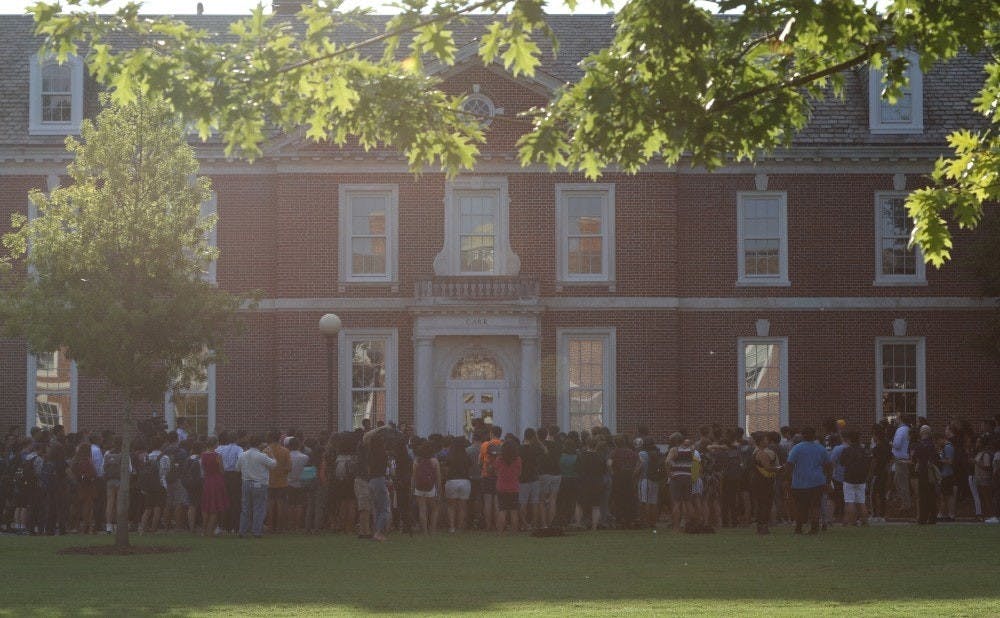As students at Duke University—encouraged to explore the multiple opinions that surround every issue, analyze a variety of approaches to a given problem and ask an abundance of questions—we often take freedom of speech for granted. We rage about the piles of homework we are assigned each night, criticize our politicians and debate which football team is very subjectively “the best.” And in all of this discourse, we forget how lucky we are to live in a society that protects our right to expression.
Freedom of speech is both mandated and protected by the Constitution of the United States of America. It is a fundamental and undeniable right that pervades the structures of our society and enables citizens to participate in the creation of a popular and accepted government and to express our views without fear of reprisal or recrimination.
This freedom permeates all aspects of life in America, and at Duke, it encourages students to interact with, consent to and challenge the rules, policies, administration, opportunities, and stigmas that comprise our University. In the past two weeks alone, the articles and opinions published by The Chronicle and student efforts to achieve social justice—such as Thursday’s rally to rename East Campus’ Carr building and protest white supremacy—are a testament to our right and desire to freely express our views.
Last Wednesday, The New York Times released a reverberating Op-Ed essay, written by an anonymous senior official in the Trump administration, who—like many Americans—believes that the President’s actions are “detrimental to the health of the republic.” In recent months, the official’s patience and stamina has waned, as Trump’s war on the media, unpredictability and his preference to “autocrats and dictators” over essential allied bonds have eroded at the official’s ability to stay silent.
In the aftermath of the essay’s release, Trump’s rage—towards the “treasonous” official and the Times for publishing the dissenting piece—has further fueled his crusade to discredit the media. Rather than debunking the message of the essay, Trump has focused on disgracing its delivery, condemning the Times for wielding its First Amendment right and publishing a controversial opinion.
This comes in the same week that Bob Woodward has been promoting his new book, Fear: Trump in the White House, which similarly describes a toxic and volatile White House culture. Here again, Trump has called the book a “work of fiction,” in an attempt to refute both the message and messenger.
Putting aside our individual views of President Trump, discarding the negative light that both Woodward and the anonymous official have cast on his actions, the important takeaway here is to celebrate the necessity of speaking up.
It seems as though somewhere along the road—around the winding corners, narrow passes, and steep inclines our country has faced together (even if we have not felt together)—we have lost sight of the importance of free speech.
We have forgotten that democracy, the very essence of our nation, is founded on the notion that every voice deserves to be heard. We have overlooked the media’s compulsory role as informant to the voters of this nation. We have allowed our own biases and judgements to close our minds to other opinions, and we have become too easily offended by diversity in thought.
In 1789, the Bill of Rights proposed freedom of speech, religion and assembly as the First Amendment to the Constitution, recognizing the need for individual expression and a dynamic national discourse. Today, this discourse is still imperative in maintaining the country’s popular autonomy, limiting the centralization of power, and striving towards social equality.
On Duke’s campus, under the jurisdiction of a private institution, freedom of speech is a provocative issue that begs the burning question of tolerance: how much will Duke tolerate? At what point will Duke limit our freedom of speech? Should our speech be limited?
The recent vandalization of the Mary Lou Williams Center for Black Culture, in which a detestable racial epithet was scrawled on a prominent sign, has spurred support for the prohibition of hate speech on Duke’s campus. How are students expected to live, learn and better themselves in a place that does not punish such sweeping intolerance or specifically outlaw its existence? The answer is simple and clear: Duke must wield its private power to ban hate speech throughout the University.
In other capacities, however, freedom of speech—at Duke and in the nation at large—must be actively encouraged, furnished by the knowledge gained from our professors, immeasurable student resources and the media. With over 6,500 minds on this campus—each of them molded by unique backgrounds, religions, values, experiences and beliefs—Duke is home to a vast expanse of thought, and it is our civic duty to employ this thought towards social justice.
Through involvement in student government, contributing to a range of news and opinion platforms, joining organizations that stimulate necessary dialogue and participating in community-wide discussions and debates, students can project their voices into the community and strive towards the creation of a more tolerant, equal and just society.
Get The Chronicle straight to your inbox
Sign up for our weekly newsletter. Cancel at any time.

